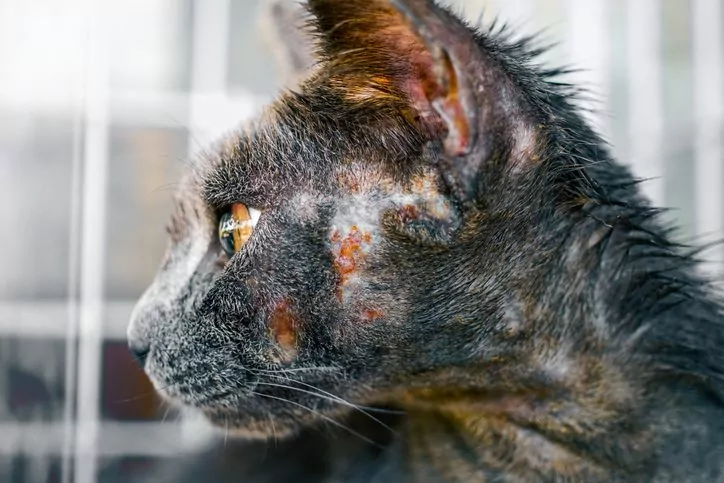7 Signs of Ringworm in Cats in Cincinnati, OH
Could your cat have ringworm? Find out more about ringworm and the 7 key signs of ringworm by reading our Cincinnati, OH, animal hospital‘s article below.

What Is Ringworm?
Despite the name, ringworm is in fact a fungal skin condition. The name “ringworm” comes from the fact that the infection creates circular lesions that appear as rings.
This condition is caused by a fungus that infects the skin. The fungus can be found in dirt and feeds off the keratin found in a cat’s skin, fur, and nails.
Ringworms can spread to other animals and humans. If you suspect ringworm in your cat or cats, contact your vet immediately.
Is Ringworm Contagious?
Yes, ringworm is contagious. It can be passed from cat to cat, cat to dog, dog to cat, and cat to human. It can be passed among all domestic animals.
Symptoms of Ringworm in Cats
The symptoms of ringworm include:
- Ring-like lesions
- Red, patchy skin
- Scaly textured skin
- Dandruff
- Hair loss
- Constant grooming or licking
- Constant scratching at the skin
The first spots that you may notice ringworms are the face, ears, nose, tail, and paws. Cats with long hair are more susceptible to ringworms and it can be harder to notice the infection until it is severe.
The symptoms of ringworm are very similar to other skin conditions, which is why it’s important to make an appointment with the vet.
Diagnosing Ringworm in Cats
Your vet will be able to diagnose the cause of your cat’s skin problems by conducting some tests.
The first test uses a black light. Some types of ringworm glow green when exposed to a black light. If the skin glows green, then it is ringworm. However, not all types of Ringworm glow, so other tests will need to be conducted.
The next test is for your vet to take a skin scraping or hair sample, which is the most reliable way to determine if your cat has ringworms. They can have it sent to a lab and there they will conduct a culture test, which encourages the fungus to grow. Once cultured, scientists can determine whether your cat has ringworm and what type of ringworm.
Treating Ringworm in Cats
Your vet can best determine what to use to treat your cat. The consensus is that home remedies and over the counter medicines have little to no effect on cats with ringworm.
Your vet will prescribe a combination of antifungal medications for your cat. You may need to give pills orally or apply a skin cream. Your vet may even recommend a medicated bath.
Tips for Caring for a Cat With Ringworm
Call a Vet
Call a vet or emergency vet. Get your cat in as soon as possible. The sooner treatment starts, the quicker your cat will get better.
Follow Your Vets Instructions
Listen to your veterinarian’s treatment instructions and follow them completely. Ask questions if there is anything you do not understand when your vet gives you the instructions.
Quarantine Your Infected Pets
You will need to keep your infected pet away from other pets and yourself since they can spread ringworm. Choosing a room that is easy to clean is best. A bathroom or hard floor room is best. Remove anything from the bathroom that can get infected, such as towels and shower curtains.
Clean Everything
Clean everything that your cat may have come into contact with since getting infected. All clothes, towels, bedding, etc. it is also best to treat floors, carpets, and anywhere else that the fungus could live.
Wear Protective Gear
While treating your cat, wear protective gear. You will need rubber gloves and a rubber apron or jacket to cover your upper body. Change your clothing as soon as you are done and wash them right away.
Our Cincinnati, OH, Animal Hospital is Here for You and Your Cat If You Suspect They Have Heartworm
Ringworm symptoms can be mistaken for other skin conditions. However, if you see ring-shaped lesions, you most likely have Ringworm. Make sure to get your pet to a vet as quickly as possible.
Our Cincinnati, OH, veterinarian can diagnose and treat your cat’s ringworm. If you suspect your cat has ringworm, reach out to our animal hospital by giving us a call at (513) 531-7117.

